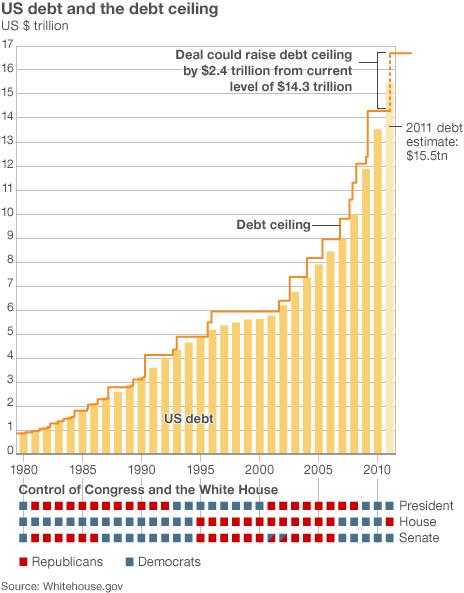US House of Representatives passes debt-limit bill
- Published
Congresswoman Gabrielle Giffords received a warm welcome at the vote
The US House of Representatives has passed by 269 votes to 161 a last-gasp deal to avoid a federal debt default.
The bill is expected to be approved by the Senate and signed into law by President Barack Obama on Tuesday.
It raises the debt limit by up to $2.4tn (£1.5tn) from $14.3tn, and makes savings of at least $2.1tn in 10 years.
There were cheers as Congresswoman Gabrielle Giffords, who was shot in the head in Tucson in January, made her first appearance on Capitol Hill.
Ms Giffords, who moved through the chamber with minimal assistance from an aide, blew kisses and said: "Thank you, thank you."
Republican Party Representative Paul Ryan: ''We spend way more money than we take in''
Deadline looms
After months of bitterly partisan deadlock, House Republican and Democratic leaders swung behind the bill on Monday, ratifying a deal sealed the night before with a phone call from House Speaker John Boehner to President Obama.
House Democrats were evenly split on the legislation - 95 for and 95 against - while 174 Republicans voted for the measure and 66 opposed it.
Senate Democratic Majority Leader Harry Reid said the upper chamber would vote on the deal at 12:00 local time (16:00 GMT) on Tuesday.
That vote will take place barely 12 hours before Washington is due - according to the US treasury department - to become unable to meet all its bills.
The vote in the Republican-controlled House was considered the biggest obstacle to the legislation; its approval by the Democratic-controlled Senate is viewed as all but certain.
In a key point for President Obama, the bill would raise the debt ceiling into 2013 - meaning he would not face another congressional showdown on spending in the middle of his re-election campaign next year.
The compromise deal deeply angered both right-wing Republicans and left-wing Democrats.
Liberals have been unhappy that the plan relies on spending cuts only and does not include tax rises, although Mr Obama could still let Bush-era tax cuts for the top brackets expire in January 2013.
House Republicans were displeased that the bill did not include more savings.
Announcing the deal on Sunday evening, President Obama said though it was not the one he would have preferred, it was a "serious down-payment" on the US deficit.
Ms Giffords - who has undergone a number of operations since she was shot in the head in January - caught lawmakers by surprise when she appeared on the floor of the House on Monday evening.
There was a standing ovation and embraces for the Democratic representative, who voted in favour of raising the debt ceiling.
'Satan sandwich'
Earlier, Vice-President Joe Biden lobbied dissenting Democrats.
The bill was the focus of criticism, some of it anguished, from both sides of the House.
"I did not come to Washington to force more people into poverty," said Democratic congressman Jim McGovern.
His colleague, Emanuel Cleaver, described the deal as "a sugar-coated Satan sandwich" on his Twitter feed.
Republican Representative Mark Mulvaney said: "At the end of the day, Washington's spending still has us sprinting toward a fiscal cliff. And this bill barely slows us down."
The deal, external would enact more than $900bn in cuts over the next 10 years.
It would also establish a 12-member House-Senate committee charged with producing up to $1.5tn of additional deficit cuts over a decade.
If the panel failed to produce at least $1.2tn in deficit savings, spending cuts would take effect across much of the federal budget.
The Pentagon would be among those areas affected, but in a concession to Democrats, individual benefits under Social Security, Medicaid and Medicare would be exempt.
The legislation also requires the House and Senate to vote on an amendment to the Constitution, forcing the US to balance its budget.
The political stalemate has unsettled financial markets, endangered Washington's coveted triple-A credit status, and exasperated Americans still grappling with unemployment of 9.2%.

- Published2 August 2011
- Published2 August 2011
- Published2 August 2011
- Published2 August 2011
- Published1 August 2011